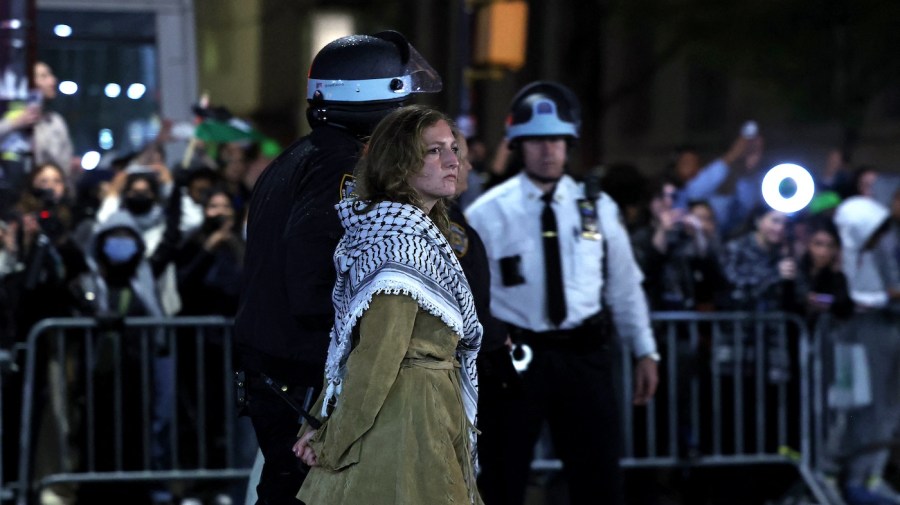I was a student at Columbia during the 1968 campus riots. After some days during which students — as well as outsiders who were not members of the university community — took over Hamilton Hall, which then as now housed Columbia College’s administrative leadership, I watched the New York Tactical Police Force enter the campus and proceed not only to arrest students but to beat many of them as well. “Up against the wall motherf—er,” was the favorite police phrase as “New York’s finest” terrorized the students.
Columbia has just witnessed a reprise of those long-ago events. The same building, Hamilton Hall, was again the epicenter of the protests. Outsiders again participated in taking the building hostage. The police were called in to clear the campus and retake Hamilton Hall. This time, it appears that they employed little if any violence while making over 100 arrests (police made an almost identical number of arrests to clear the City College campus, which is located not far from Columbia).
The 1968 riots were spurred by a combination of opposition to the Vietnam War and concern for the Black community that lived alongside the campus but had long been ignored by university authorities. Indeed, Columbia had planned to build what activists termed a “segregated gymnasium” in Morningside Heights, adjacent to the campus.
Although it was predominantly white students who instigated the protests, Black students felt that they should pursue their cause separately, and expelled the white students, who then took over the Low Library building, where the offices of Grayson Kirk, the university president, were located.
The current riots have seen no such disunity among the protesters. They are the result of a commonly shared sense of deep-seated opposition to Israel’s conduct of the Gaza war. Moreover, in contrast to what took place in 1968, the Columbia protesters, like those in universities across the U.S., have targeted a segment of the campus community. Students who set up tent communities on campus before the police cleared them harassed Jewish students who identified with Israel, at a minimum calling them supporters of genocide and often using far more repulsive epithets.
It is highly doubtful that such behavior, coupled with property damage and the disruption of campus activities, has actually helped the Palestinian cause. Many Americans have sympathized with the Gazans whose homes have been bombed, who have been displaced and who have suffered from shortages of food and medical care. But the violent campus protests, like the blocking of bridges across the country, are certain to alienate all but the most committed supporters of the Palestinians in general and Hamas in particular. And Israeli Prime Minister Benjamin Netanyahu and his right-wing cabinet allies are certain to benefit most from any shift in public opinion away from support of Gaza’s populace.
Fearful of the collapse of his government, Netanyahu continues to refrain from ousting his more extreme ministers, whose advocacy of harsh policies in both Gaza and the West Bank provide fodder for those who assert that Israel is pursuing a genocidal policy against Palestinians.
Their statements undermine the reality that the Israelis have permitted increasingly greater amounts of food and medicine to enter the Gaza Strip and have significantly modified their aerial attacks on targets in Gaza.
Moreover, Netanyahu’s assertion that the Israel Defense Forces will enter Rafah whether or not Hamas releases the remaining 130 hostages (or whatever number are still alive) reinforces the impression that the prime minister seeks to prolong the war to enhance the prospects of his political survival.
Netanyahu’s statements also undermine U.S. Secretary of State Antony Blinken’s tireless efforts to negotiate a ceasefire that would enable the hostages to return home after their horrible ordeal.
Extremist statements emanating from Jerusalem also add to the number of members of Congress, notably but not exclusively within the Democratic Party, who will press the Biden administration both to confront Israel openly and to slow-roll American military assistance to the Jewish state. Israel desperately needs that assistance to buttress its capabilities on its northern border, where Hezbollah’s rockets have driven over 100,000 Israelis from their homes.
Netanyahu’s right-wing ministerial partners, Bezalel Smotrich and Itamar Ben Gvir, seem to think that they can poke America in the eye while Washington continues to provide Israel with the support it needs. Netanyahu should know better. At a time when campus rioters and more violent activists are undermining the Palestinian cause, the last thing Israel should be doing is to have ministers issuing statements that confirm the worst accusations of the country’s American enemies.
Netanyahu should have had the courage to dismiss these two men months ago. They continue to give him every reason to be rid of them. At a time when Israel faces hostility in multiple directions — from Hamas, Hezbollah, Syria, Iran and even the Houthis — the last thing that country needs is a leader who puts his own prospects ahead of the welfare of the state he has led for so long.
Dov S. Zakheim is a senior adviser at the Center for Strategic and International Studies and vice chairman of the board for the Foreign Policy Research Institute. He was undersecretary of Defense (comptroller) and chief financial officer for the Department of Defense from 2001 to 2004 and a deputy undersecretary of Defense from 1985 to 1987.
